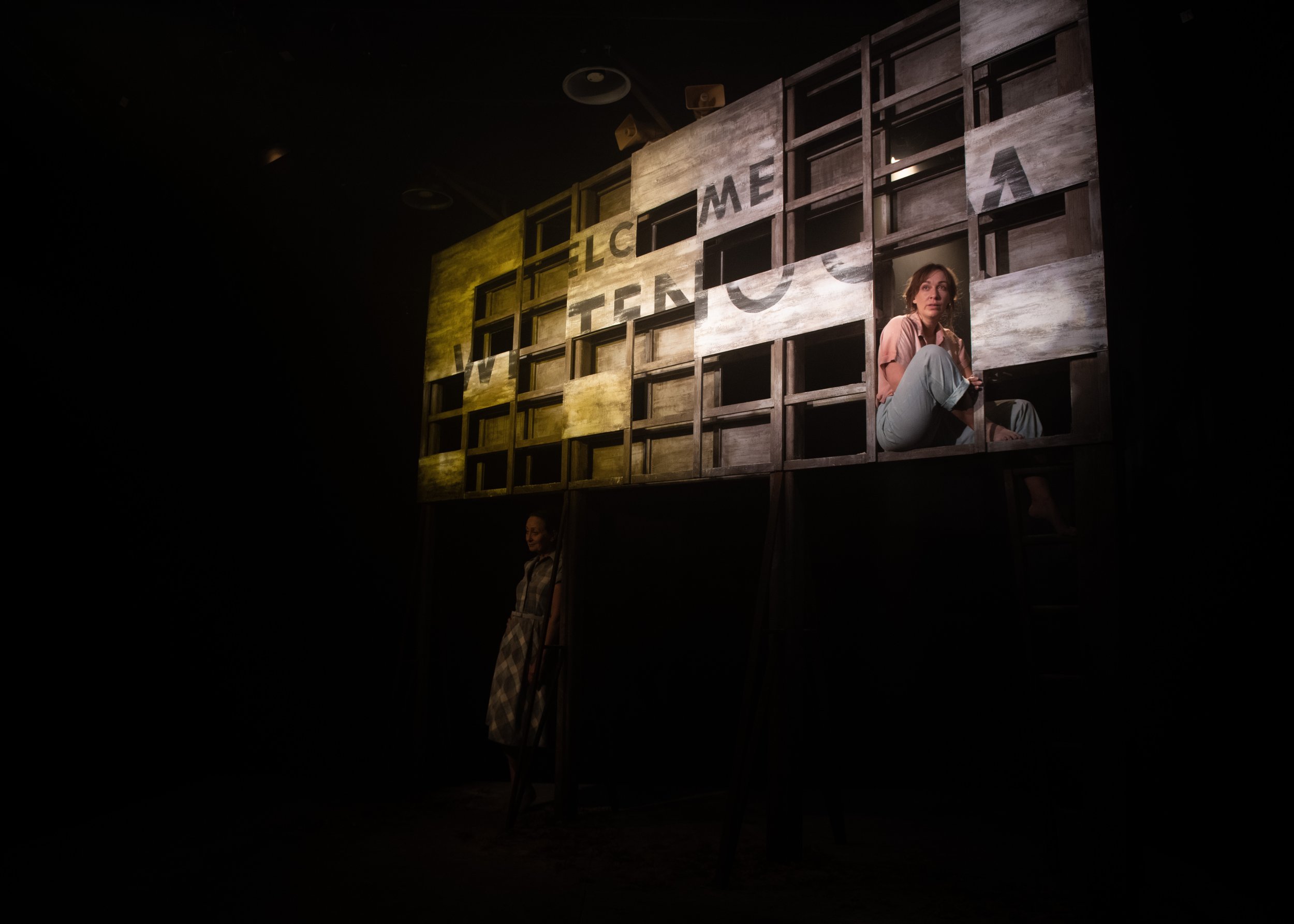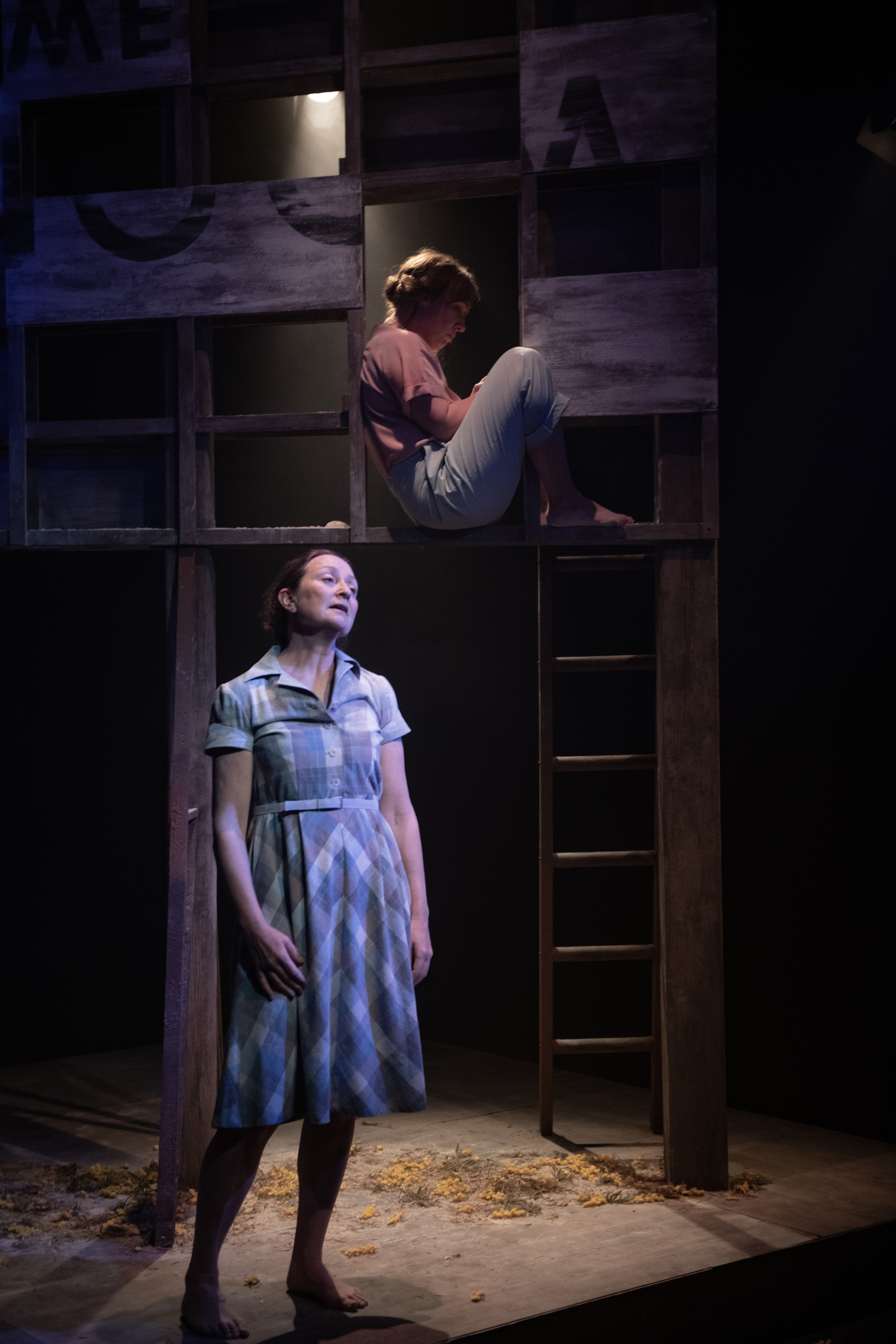With Wittenoom, Mary Anne Butler has achieved something remarkable Stage Whispers / a powerful and compelling requiem The Conversation / a superb piece of work, brilliantly conceived and executed The Blurb / in short, a sensation Theatre Matters
Dot is dying of mesothelioma; an incurable cancer caused by blue asbestos. Her prognosis is days, if not hours left to live. Pearl sits by Dot’s deathbed as the Dogs of the Apocalypse hover, waiting for Dot to finally let go.
Flashback to The Past: Dot and Pearl live in Wittenoom; the blue asbestos mining town in Western Australia’s Pilbara region. So begin glorious days when the Pilbara’s stunning landscapes, magnificent wildlife and close-knit community shaped an idyllic lifestyle: the wild-natured Dot making the most of every second, while an adolescent Pearl tries to make sense of what her own life might be. Dot and Pearl’s personal stories weave into the frame of the broader mining industry, asking questions of accountability in an era where the health and cultural impacts of mining ricochet as heavily in 2022 as they did in 1962.
Wittenoom juxtaposes vivid life with looming death in an ultimately hopeful reminder that life is here, and now: a chance gift to be lived to the full.
Wittenoom (2023)
Stage Whispers - With Wittenoom, Mary Anne Butler has achieved something remarkable. This is an intense, passionate play, sharp and evocative in its imagery, visceral in its emotions.
The Conversation - The writing is dark and spare… [it] draws themes of grief, memory and injustice together in an undeniably moving way. It is a powerful and compelling requiem for the people whose lives have been destroyed… a stark reminder of the deceptive and immoral practices large corporations maintain in the name of profit.
The Blurb - …a superb piece of work, brilliantly conceived and executed. Mary Anne Butler has written a deeply moving and engaging play, with authenticity at its core.
ArtsHub - One of the most powerful situations from Mary Anne Butler’s moving text is how many poor itinerant Australians feel the need to tolerate injury and illness working in extraction industries so their children can have a better life. If this is a moving subject for a duologue, a national conversation might be why a country with a social safety net, a good public school system, and a healthy economy fails to communicate to its marginalised citizens in regional areas that there are more choices between being simply rich and simply poor. It is the cleverness of the text that it implies this question without ever asking it, and movingly dramatises the consequences.
Kate Herbert - Wittenoom is intense, densely written, funny and painful and it tells a powerful yet intimate tale.
Theatre Matters - Wittenoom… was in short, a sensation. The writing took the audience on a journey through some very dark history embedded deep in the Australian outback… I was both horrified and hooked. It’s that sense that you get as an audience member (when work is this good), where you find yourself transported to another time and place. This play has managed to straddle a difficult space of tackling the enormity of the issues embedded in it, with humour and humanity. Quality work is always dependent on the substance of the writing, first and foremost. This story was not only compelling and engaging, but also had an inherent social justice slant to it. The call to action in this play was strong…
Theatre First - Wittenoom is superb; full of humour and pathos, gorgeous to listen to and beautiful to look at. It reminds us of a dark chapter of the Australian story, exposing it to the light and reminding us of the real people at its centre.
Theatre Travels - Wittenoom is a deeply personal and human look at a horrific and ongoing injustice… a powerful personal story of lost innocence, illness and regret bursting at the seams with brilliant, skilful creatives.
The Age - Mary Anne Butler, whose play Broken took out the lucrative Victorian Premier’s Prize for Literature in 2016, finds an unexplored angle in Wittenoom, creating a poetic two-hander from the lives and sad fate of the town’s women and children… And I doubt I’ll be the only one reflecting on the people most sidelined by the history of Wittenoom – the traditional owners, the Banjima people. As the play reveals, they were often given the worst jobs by the mining industry, and they’re still waiting today for whitefellas to remediate the land so that they can continue to respect their ancient connection to Country in safety.





